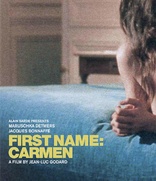First Name: Carmen Blu-ray Movie
HomeFirst Name: Carmen Blu-ray Movie 
Prénom CarmenKino Lorber | 1983 | 85 min | Not rated | Jun 18, 2019
Movie rating
6.6 | / 10 |
Blu-ray rating
| Users | 0.0 | |
| Reviewer | 4.0 | |
| Overall | 4.0 |
Overview
First Name: Carmen (1983)
First Name: Carmen tells the parallel stories of a quartet rehearsing Beethoven and a group of young people robbing a bank, supposedly to get the funds to make a film.
Starring: Maruschka Detmers, Jacques Bonnaffé, Myriem Roussel, Christophe Odent, Bertrand LiebertDirector: Jean-Luc Godard
| Foreign | Uncertain |
| Drama | Uncertain |
| Romance | Uncertain |
| Music | Uncertain |
| Comedy | Uncertain |
| Crime | Uncertain |
Specifications
Video
Video codec: MPEG-4 AVC
Video resolution: 1080p
Aspect ratio: 1.33:1
Original aspect ratio: 1.33:1
Audio
French: DTS-HD Master Audio 2.0 Mono (48kHz, 24-bit)
Subtitles
English
Discs
Blu-ray Disc
Single disc (1 BD)
Playback
Region A (C untested)
Review
Rating summary
| Movie | 4.0 | |
| Video | 4.5 | |
| Audio | 4.0 | |
| Extras | 2.5 | |
| Overall | 4.0 |
First Name: Carmen Blu-ray Movie Review
Reviewed by Dr. Stephen Larson April 26, 2020Note: FIRST NAME: CARMEN contains both female and male frontal nudity. Viewer discretion is advised.
The pre-credits of First Name: Carmen display the Golden Lion trophy that Jean-Luc Godard won after directing his twenty-fifth full-length feature at the 1983 Venice Film Festival. The shiny brass that fêtes one of the world's most accomplished auteurs contrasts sharply with the melancholic film he made to later earn the prize. Godard plays filmmaker "Uncle Jean" (a version of himself), who's relegated to a lonely room in a sanatorium as he battles depression and writer's block. Jean's niece Carmen X (Maruschka Detmers) pays a visit and solicits his help. Carmen and a ragtag group will soon rob a bank and she needs a strategy to set it all up. Carmen and Jean conceive that the robbers make it look like they're present to make a documentary film. Carmen also requests that she use Jean's seaside house in Trouville as a getaway safe haven and her uncle acquiesces.
Carmen and her accomplices recall the thieves who try to pull off a robbery in Godard's Bande à part (1964). In First Name: Carmen, Godard plays the robbery of a bank in downtown Paris with a mix of slapstick and half-seriousness. The off-screen Godard directs the sequence as if Carmen and her collaborators are filming a movie. Watching this film twice, the gunfire looks and sounds real but the spray bullets dodn't seem to always hit their intended targets or showing a convincing enough aftermath. Godard also refrains from showing much blood. As Carmen scampers across the bank's corridors, she gets hooked up with Joseph (Jacques Bonaffe), a handsome and auburn-haired security guard. He handcuffs her to him. Carmen pulls on Joseph as the pair rush out of the bank. They get into a car and head to a gas station to relief themselves. But because they're cuffed together, they have to head into the same (men's) restroom! It's here that Godard enacts—in a pretty revulsive way—a semi-recurrent trope in his oeuvre: bodily fluids and liquids. While Carmen and Joseph urinate (thankfully, mostly off-screen), a stubby man (Jacques Villeret) eats yogurt out of a can. (Did Tarantino see First Name: Carmen before he made Reservoir Dogs and his subsequent features?)
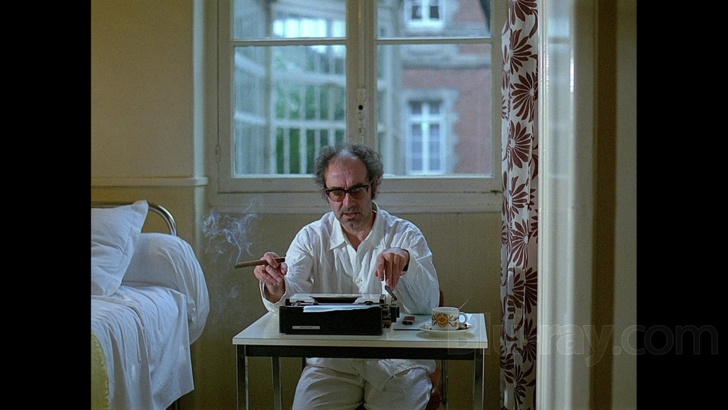
The auteur at his typewriter.
When the action shifts to Uncle Jean's seaside abode (and later the Le Grand Hotel Inter Continental), Godard next develops the film's theme of impotence. Carmen and Joseph become attracted to each other and the latter becomes more prurient and aggressive. However, it's Carmen who invites this lustful desire by putting her hand over Joseph's crotch. The scenes inside Jean's spacious home and in the hotel often depict Joseph chasing Carmen around or talking in the kitchen fully unclothed. It's ironic that Godard titled his last picture Passion (1980) because even while it'd seem that Carmen and Joseph have mutually passionate feelings, they can't be fulfilled. Joseph's mind must carry libidinous thoughts but he can neither channel nor transfer them over to his sex drive. He is an impotent being.
The film's editing by Fabienne Alvarez-Giro and Suzanne Lang-Willar during the robbery and scenes at Uncle Jean's is most though-provoking. Carmen and her own quartet are juxtaposed with interior shots by a string quartet performing five of Beethoven's quartets in ascending order. It's up to the viewer if the music "comments" on the action or if it's used as counterpoint. I'm reminded that Murnau subtitled his great 1922 vampire classic Nosferatu with A Symphony of Horror, as if it to say that there's a symphonic rhythm to the images and their macabre mood. One interpretation is that Godard is using the pace of the string-playing to reflect the choreography and own pace of the robbery that's being staged.
Another provocative juxtaposition is the rolling waves of the sea that are intercut with the amorous advances that Joseph makes to Carmen. Cinematographers Raoul Coutard and Jean-Bernard Menoud linger their cameras on the sun-gleamed water to quite beautiful effect. Abbas Kiarostami would later take this aesthetic to its logical extreme in Five Dedicated to Ozu (2003) in which his camera remains fixated on a seaside port in five segments. I'm also reminded of the postcard images of the Mediterranean Sea that Theo Angelopoulos artfully captured in his films.
First Name: Carmen is based on Prosper Mérimée's novella, Carmen, but Godard only retains some remnants of the text. (The same is true of his spare use of elements derived from Bizet's opera.) Otto Preminger's Carmen Jones (1954) is a more formal influence. While I've seen a number of Preminger's films, I haven't got to Carmen Jones yet so I can't comment on specific connections. However, I've read and heard that Godard incorporates bits of Harry Kleiner's screenplay into his own script.
First Name: Carmen Blu-ray Movie, Video Quality 
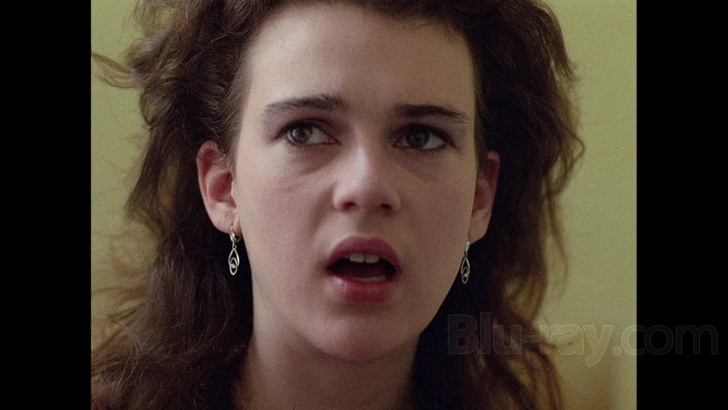
Kino Lorber's subsidiary Kino Classics continue their trend of releasing very fine editions of vintage Godard classics. First Name: Carmen appears on a BD-50 using the MPEG-4 AVC encode. The film's aspect ratio—both as it was shot and exhibited—has been a topic for debate over the years. I can confirm from the movie's French press kit, which was prepared by the production company Films Alain Sarde, that the images were composed in 1.33:1. I corroborated this by perusing a French film periodical that reviewed the movie. However, it was also shown in 1.66:1 in Paris cinemas as well as across the United States. International Spectrafilm Distributors lists 1.66:1 in their press kit and at least one print review does too. Raro Video and Lions Gate both presented First Name: Carmen in full frame on their DVDs while Fox Lorber and Warner UK displayed it in letterboxed (non-anamorphic) 1.66:1. It would have made this a more complete package if Kino offered both aspect ratios but at least we get an authentic presentation of what Godard, Coutard, and Menoud originally intended.
I can't confirm whether or not the transfer stems from a 4K scan but the print looks clean and sparkling without any gloss or rub-outs. Red, blue, and green show off their rich colors and details. In her review for The New Yorker, Pauline Kael described the color scheme as "a limited palette—soft, somber tones and subdued golden ones." I'd affirm her description (see especially Screenshot #s 5, 9, and 12). Kael praised Coutard's "ravishing lighting" and I wholeheartedly second that. Check out the lighting on the hollow wood of the instruments in #4 and inside Jean's house in #13. Kino has encoded the feature at an average video bitrate of 34998 kbps.
Ten chapter breaks accompany the 85-minute movie.
First Name: Carmen Blu-ray Movie, Audio Quality 
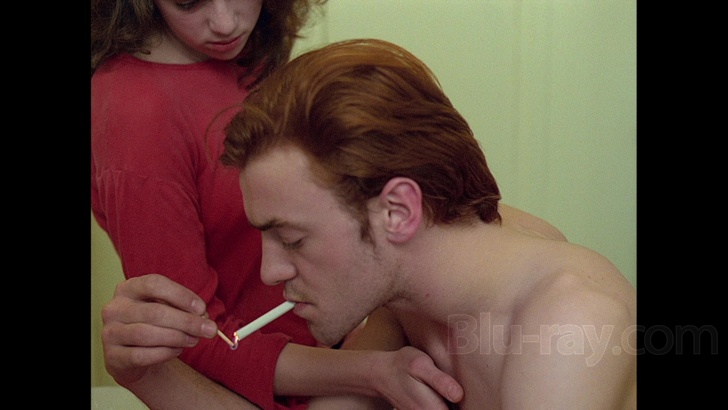
Kino supplies a French DTS-HD Master Audio Dual Mono (2018 kbps, 24-bit) as the sole audio track. The monaural mix is in very solid shape with no hints of any pops, hiss, crackles, or tape dropouts. As he's done on Vivre Sa Vie (1962) and other films, Godard plays with the dialogue and substitutes spoken words for ocean waves in one instance. There are some moments where the dialogue "checks out" for a brief time. For the record, the following pieces by Beethoven are performed in the film: Quartets No. 9 (op. 59 in C), no. 10 (op. 74 in E), no. 14 (op. 131 in C minus), no. 15 (op. 132 in A minus), and no. 16 (op. 135 in F). According to Craig Keller on this disc's commentary, Godard visited the set of Coppola's One from the Heart (1982) and must have gotten the idea to use a ballad by Tom Waites, which he does here with Waites's "Ruby's Arms."
The optional (white) English subtitles are legible and easy to read.
First Name: Carmen Blu-ray Movie, Special Features and Extras 
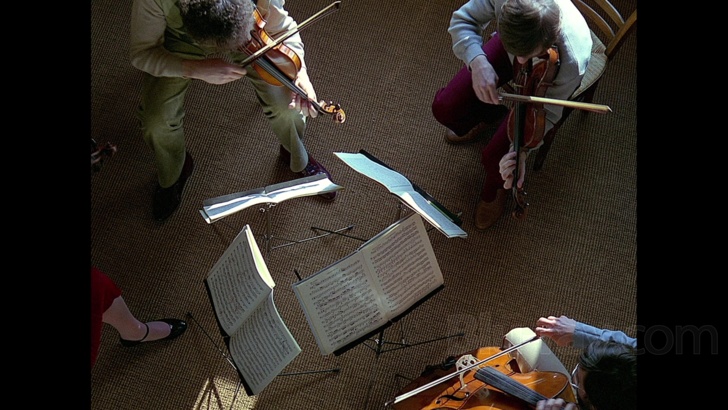
- Feature Commentary by Film Historian Craig Keller - Keller offers a scholarly yet not-too-dry audio essay on the themes, stylistic devices, and possible messages of First Name: Carmen. He also places it in the wider context of Godard's career and derives parallels to his other films. Keller speaks all in English (except for some film titles; the track isn't subtitled).
- Le changement à plus d'un titre: Changer d'image (1982), a short film by Jean-Luc Godard (10:32, 1080p) - this TV short film has Godard playing himself with his back to the camera. He cuts to extra-diegetic images and also employs very long superimpositions. There's an alternate track with commentary by Craig Keller, who discusses the changes to France's national leadership when the film was made, Godard's relationship to Mozambique, and possible meanings that can be gleaned from the images. The short is presented in French with English subtitles.
- Bonus Trailers - trailers for five Godard movies (but unfortunately, not First Name: Carmen): Détective, Film Socialisme, Goodbye to Language, Hélas Pour Moi, and The Image Book.
- Leaflet - in her printed essay, film critic Kristen Yoonsoo Kim delivers a formal and thematic analysis of several major scenes from First Name: Carmen. The leaflet also contains seven stills from First Name: Carmen (including two spread across two pages) and a truncated cast/crew list.
First Name: Carmen Blu-ray Movie, Overall Score and Recommendation 
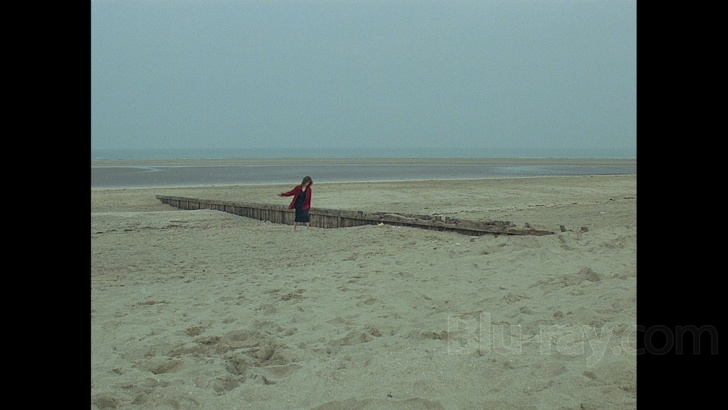
First Name: Carmen is narratively one of Godard's more accessible films but his formal devices and cutting patterns can lead the viewer through a tricky terrain. I got more out of the movie on my second viewing and savor the cinematography's framing and lighting. I should mention Carmen's remark about a "video craze" because Godard centralizes the technological apparatus in virtually all his work and the videocassette recorder is seen in one of the hotel rooms. Coppola and Storaro were intrigued with merging video with film for an "electronic cinema" in One from the Heart and it must have rubbed off on Godard after visiting the set of that musical. Godard was no doubt aware of the "video revolution" and I think he decided to photograph First Name: Carmen in full frame rather than widescreen to reflect the "square image" that consumers were adapting to in the early years of Betamax and VHS. While First Name: Carmen was shot on film in Eastmancolor and not videotape, there's nonetheless an image/screen ratio dialectic that greatly interested Godard.
Kino Lorber's Blu-ray looks and sounds excellent with a bonus Godard short to go with two commentaries by Craig Keller. STRONGLY RECOMMENDED.
Similar titles
Similar titles you might also like

Tie Me Up! Tie Me Down!
¡Átame!
1989

Saraband
2003

Marius
1931

A Tale of Summer
Conte d'été / A Summer's Tale
1996

Classe tous risques 4K
The Big Risk
1960

Pierrot le fou
1965

Made in Hong Kong
Heung Gong jai jo / Xiang Gang zhi zao / 香港製造
1997

Days of Being Wild
阿飛正傳 / Ah fei zing zyun / Theatrical and Alternate versions
1990

All About Lily Chou-Chou
リリイ・シュシュのすべて
2001

Pépé le Moko
1937

They Live by Night
1948

Yoyo
Yo Yo
1965

Boxcar Bertha
1972

My Night at Maud's
Ma nuit chez Maud
1969

Le grand amour
The Great Love
1969

Mauvais Sang
The Night is Young | Special Edition including Mr. X
1986

Boyfriends and Girlfriends
1987

The Aviator's Wife
La femme de l'aviateur
1981

Subway 4K
1985

La Piscine
The Swimming Pool / French and English versions
1969
